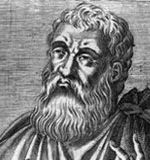Saint of the Day Online - St. Justin Martyr
Saint of the Day for Thursday, June 1st, 2017
01-06-2017
Saint Name: St. Justin Martyr
Place: Flavia Neapolis, Jerusalem
Birth: 100 A.D
Death: 165 A.D
St. Justin Martyr born at Flavia Neapolis, about A.D. 100, converted to Christianity about A.D. 130, taught and defended the Christian religion in Asia Minor and at Rome, where he suffered martyrdom about the year 165. Two "Apologies" bearing his name and his "Dialogue with the Jew Tryphon" have come down to us. Leo XIII had a Mass and an Office composed in his honor and set his feast for 14 April.
Justin was a voluminous and important writer. He himself mentions a "Treatise against Heresy" quotes a "Treatise against Marcion" which may have been only a part of the preceding work. Eusebius mentions both, but does not seem to have read them himself; a little further on (IV, xviii) he gives the following list of Justin's works: "Discourse in favour of our Faith to Antoninus Pius, to his sons, and to the Roman Senate"; an "Apology" addressed to Marcus Aurelius; "Discourse to the Greeks"; another discourse called "A Refutation"; "Treatise on the Divine Monarchy"; a book called "The Psalmist"; "Treatise on the soul"; "Dialogue against the Jews", which he had in the city of Ephesus with Tryphon, the most celebrated Israelite of that time.
The only pagan quotations to be found in Justin's works are from Homer, Euripides, Xenophon, Menander, and especially Plato (Otto, II, 593 sq.). His philosophic development has been well estimated by Purves ("The Testimony of Justin Martyr to Early Christianity", London, 1882, 132): "He appears to have been a man of moderate culture. He was certainly not a genius nor an original thinker." A true eclectic, he draws inspiration from different systems, especially from Stoicism and Platonism.
In many passages, however, Justin tries to trace a real bond between philosophy and Christianity: according to him both the one and the other have a part in the Logos, partially disseminated among men and wholly manifest in Jesus Christ